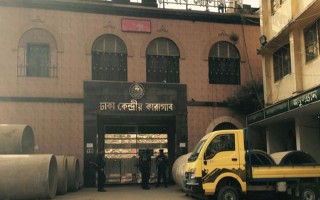Nine doctors take care of 90,000 jail inmates
Lack of physicians and medical facilities inside overcrowded jails across the country is severely hampering healthcare services with only nine doctors, against approved 141 posts, for about 90,000 inmates.
Worried prison authorities have approached home ministry and even prime minister Sheikh Hasina seeking improvement in the facilities for the inmates.
A number of recently released inmates told New Age that they found medical services inside the prisons very poor due to shortage of physicians while prison officials in different jails say they are struggling to provide medication, especially when an emergency arises.
Rights activist Adilur Rahman Khan, incarcerated for few months in 2013, has blamed poor medication inside the jail for the higher number of deaths of inmates.
The prison population statistics of 2017 say that 219 inmates died in 2010 ‘naturally’ while 199 others died in 2011, 204 in 2012, 220 in 2013, 200 in 2014, 236 in 2015 and 173 in 2016.
At least 1,331 others died ‘naturally’ between 2000 and 2009 in jail custody, according to the statistics.
Rights groups Odhikar and Ain O Salish Kendra, citing only the recorded cases of deaths in jail in the last few years, have blamed poor medication and lack of emergency services for the high number of deaths in prisons.
New Age approached inspector general of prison Brigadier General AKM Mustafa Kamal several times since January 24 for his comments on the shortage of physicians and medical facilities but he did not respond.
On January 20, prime minister Sheikh Hasina visited home ministry when the prisons chief mentioned the limitation of health services in jails.
According the officials, the prison chief informed the home ministry meeting about the shortage of physician and ambulance services of the jail, and called for immediate deputation of physicians from the health ministry.
Dhaka’s deputy inspector general Tipu Sultan was also approached for comment but he denied that the deaths were only the result of poor health facilities inside the jails.
At least two government physicians, including one who had served in jail in the past, told New Age that physicians were unwilling to work under prison authorities for various reason including of their job nature and dominance on their services.
A Dhaka University student, who was arrested in Dhaka on December 26, 2018 just four days before the December 30 elections and was released on bail on January 28, told New Age Friday that he went to jail physician in Dhaka Central Jail in Keraniganj during his stay in jail.
‘I found a queue of 300 people in front of a physician … less than one minute for the patients with different problems,’ said the student having political affiliation with the main opposition Bangladesh Nationalist Party.
He said only those having money arranged better treatment at the jail hospital or in emergency cases the jail physician would refer patients to the hospital outside.
Like him, another inmate said whoever approached the physician the common treatment is ‘paracetamol’ or ‘antacid’ tablets.
According to the prison population statistics of 2017, the jail officials said inmates were given treatment at least 8,12,034 times alone in 2016 while the number of treatment was 11,39, 432 times in 2015.
It also stated that both male and female received treatment 10,343 times outside the jail hospital for various diseases including heart ailments, TB and asthma.
As per the home ministry statistics, the prison authorities have only nine physicians out of their 141 approved physicians.
The health ministry deputed only nine physicians to the prison authorities while civil surgeons engaged one of their physicians to visit the jails.
The jail officials have said the physicians appointed by the civil surgeon pay three or four visits a week and also respond to emergency calls.
Of the nine physicians, a dentist looks after the 200-bed hospital at Kashimpur Central Jail in Gazipur.
Another female physician was recently posted to the prison headquarters and she often looks after jailed BNP chairperson Khaleda Zia, who has been in jail since February 8, 2018 over corruption charges.
Asked how the prison authorities manage around 90,000 inmates with nine physicians, two jail superintendents and a jailor said they took assistances from nurses and pharmacists and tried to send inmates to local district hospitals as soon as possible.
The number of inmates of prisons reached 95,321 as of December 26, 2018 ahead of elections held on December 30 but the number started decreasing after the elections.
Rights organisation Odhikar secretary Adilur Rahman Khan said some inmates died in jail days after they were tortured in custody and sent to jail.
‘Proper treatment is must for the inmates as large numbers of them are under trial,’ he added.
Home minister Asaduzzaman Khan admitted that physicians were unwilling to serve under the prison authorities for various reasons.
He said even after providing better facilities, physicians could not be attracted to the prison hospital in Kashimpur.
Referring to the prime minister’s latest meeting, the minister said they were now planning to form a physician pull for the agencies under the home ministry including of Border Guard Bangladesh, police and the prison.
The latest health bulletin by the Directorate General of Health Services in 2017 has no information about the health services for inmates but stated population per registered physician was 1,871.
News Courtesy: www.newagebd.net











